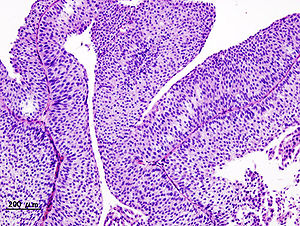Urothelial carcinoma
| Transitional cell carcinoma | |
|---|---|
 |
|
| Histopathology of transitional carcinoma of the urinary bladder. Transurethral biopsy. H&E stain. | |
| Classification and external resources | |
| Specialty | Oncology |
| ICD-O | M8120/3-8130 |
| eMedicine | med/2003 radio/711 |
| MeSH | D002295 |
Transitional cell carcinoma (TCC) also urothelial carcinoma (UCC), is a type of cancer that typically occurs in the urinary system. It is the most common type of bladder cancer and cancer of the ureter, urethra, and urachus. It is the second most common type of kidney cancer, but accounts for only five to 10 percent of all primary renal malignant tumors.
TCC arises from the transitional epithelium, a tissue lining the inner surface of these hollow organs.
When the term "urothelial" is used, it specifically refers to a carcinoma of the urothelium, meaning a TCC of the urinary system.
Signs and symptoms of TCC are entirely dependent on the location and extent of the cancer.
Urothelial carcinoma is a prototypical example of a malignancy arising from environmental carcinogenic influences. By far the most important cause is cigarette smoking, which contributes to approximately one-half of the disease burden. Chemical exposure, such as those sustained by workers in the petroleum industry, the manufacture of paints and pigments (e.g., aniline dyes), and agrochemicals are known to predispose one to urothelial cancer. Interestingly, risk is lowered by increased liquid consumption, presumably as a consequence of increased urine production and thus less "dwell time" on the urothelial surface. Conversely, risk is increased among long-haul truck drivers and others in whom long urine dwell-times are encountered. As with most epithelial cancers, physical irritation has been associated with increased risk of malignant transformation of the urothelium. Thus, urothelial carcinomas are more common in the context of chronic urinary stone disease, chronic catheterization (as in patients with paraplegia or multiple sclerosis), and chronic infections. Some particular examples are listed below:
...
Wikipedia
